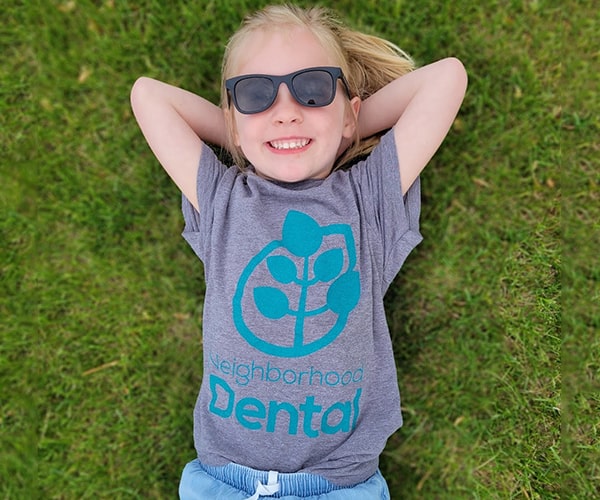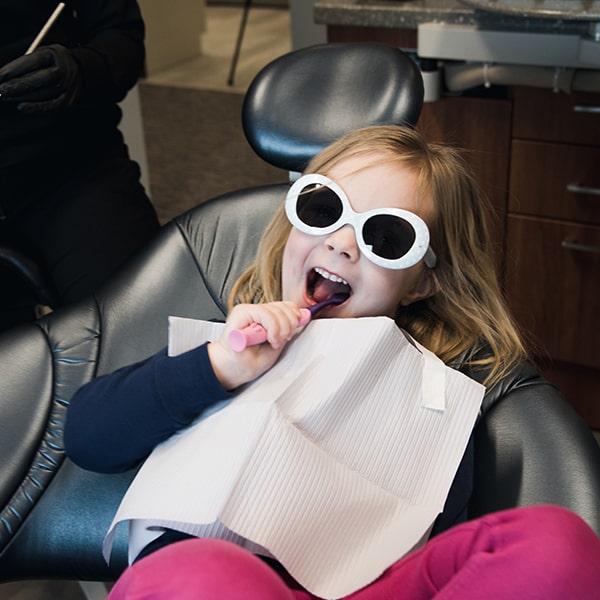Pediatric Dentistry in Gretna, NE
Creating healthy habits for a lifetime of smiles.
Your Child’s First Visit
What to expect when you visit our Gretna dentists.
The first dental visit should be just before your child’s first tooth erupts. The first dental visit is usually short and involves instruction as to proper oral health care. We may ask you to sit in the dental chair and hold your child during the examination. Our team… Click to open this link in the same window … works hard to make your child’s first visits to a dental office a pleasant experience.
The first “regular” dental visit should be just after your child’s third birthday. The first regular dental visit involves very little treatment. We may ask you to sit in the dental chair and hold your child during the examination. You may also be asked to wait in the reception area during part of the visit so that a relationship can be built between your child and your dentist.


During the first visit, we will:
We have been asked this question many times. We suggest you prepare your child the same way you would before their first haircut or trip to the shoe store. Your child’s reaction to his first visit to the dentist may surprise you.
What about Preventative Care?
Tooth decay and children no longer go hand in hand.
At our office, we are concerned with all aspects of preventative care. We use dental sealants to protect your child’s teeth. Dental sealants are bonded to the chewing surfaces of decay-prone back teeth. This is just one of the ways we will set the foundation for your child’s lifetime of good oral health.
-
Cavity prevention
Most of the time, cavities are due to a diet high in sugary foods and a lack of brushing. Limiting sugar intake and brushing regularly, of course, can help. The longer it takes your child to chew their food and the longer the residue stays on their teeth, the greater the chances of getting cavities.
Every time someone eats, an acid reaction occurs inside their mouth as the bacteria digests the sugars. This reaction lasts approximately 20 minutes. During this time, the acid environment can destroy the tooth structure, eventually leading to cavities.
Consistency of a person’s saliva also makes a difference; thinner saliva breaks up and washes away food more quickly. When a person eats diets high in carbohydrates and sugars, they tend to have thicker saliva, which in turn allows more of the acid-producing bacteria that can cause cavities.
-
Tips for cavity prevention
Our Gretna dental team has amazing tips for preventing cavities. These include:
-
Limit the frequency of meals and snacks
-
Encourage brushing, flossing, and rinsing
-
Watch what your child drinks
-
Avoid giving your child sticky foods
-
Make treats part of meals
-
Choose nutritious snacks
-

What to Know about Baby Teeth

The first baby teeth that come into the mouth are the two bottom front teeth. You will notice this when your baby is about six to eight months old. Next to follow will be the four upper front teeth and the remainder of your baby’s teeth will appear periodically. They will usually appear in pairs along the sides of the jaw until the child is about two and a half years old.
At around two and a half years old, your child should have all 20 teeth. Between the ages of five and six, the first permanent teeth will begin to erupt. Some of the permanent teeth replace baby teeth, and some don’t. Don’t worry if some teeth are a few months early or late, as all children are different.
Baby teeth should be cared for as they not only hold space for permanent teeth, but they are important to chewing, biting, speech, and appearance. For this reason, it is necessary to maintain a healthy diet and daily hygiene.
Schedule Your Visit
